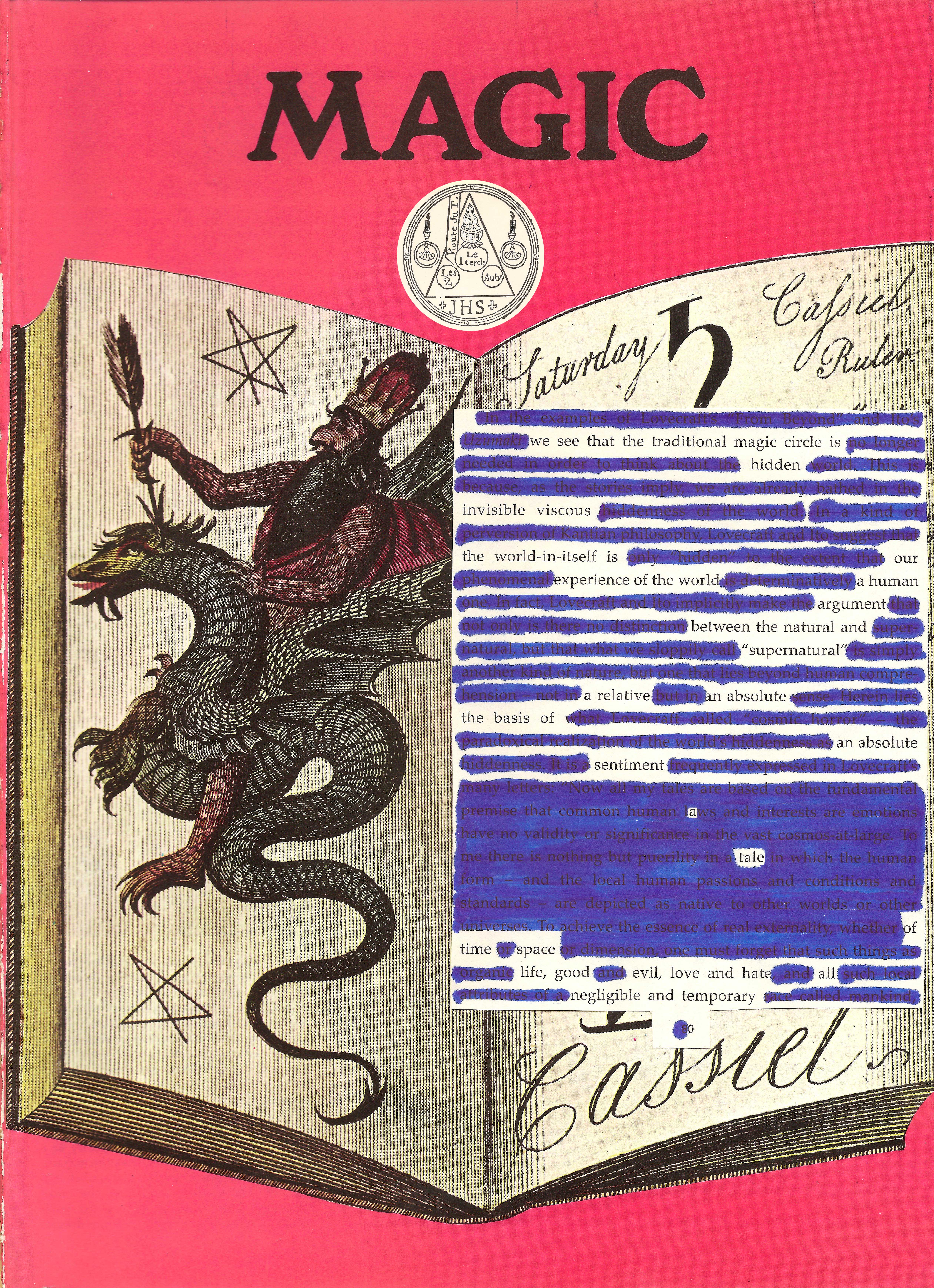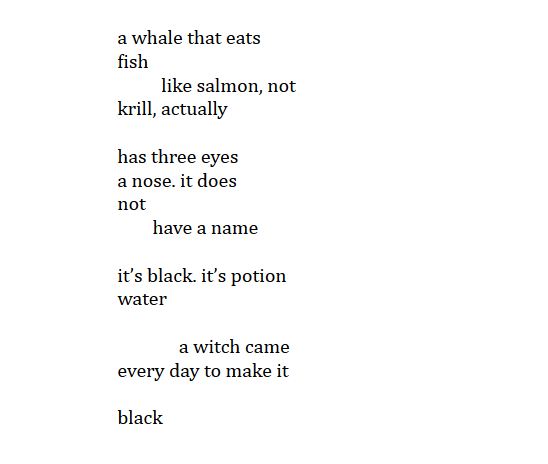A DOSE OF CERTAIN THINGS
tree limb and a memory of horses.
I have made a bleached skull, No Name
tree limb and a memory of horses.
I have made a bleached skull, No Name
Magic lay over everything—
in the fragrance,
the assembling,
the fittings.
It came in the light.
She found herself alone,
the light falling with happiness.
with perfect distinctness,
going back to the strange beginning.
The rest contracted,
pressed close,
a stiffness, puzzled and interested.
She must find the answer,
say the answer to herself.
She tried to smile, felt her way.
It was nothing.
It couldn’t be anything.
It was dignity in black hat and black gloves.
Somewhere out in the sunshine:
the piping note, out of tune.
She went slowly upstairs,
there was no hurry.
A little crack
in an upper pane
shone like a gold thread.
(Source: final chapter of Dorothy Richardson’s The Pointed Roofs: Pilgrimage)
Method: I often think my erasures might better be called pluckings. I go through a text and “pluck” words and phrases that call to me. I look for energy, vividness, peculiarity. I might go back, pluck more, for sense, or because the developing poem wants more, sees more, begins to understand itself. I hone. My rule: keep everything in the exact order and the exact form (verb form, pronoun gender, etc.) that the source text dictates; no rearranging; no cheating.
Shirley Glubka is a retired psychotherapist, the author of three poetry collections and two novels. Her most recent book: The Bright Logic of Wilma Schuh: a novel (Blade of Grass Press, 2017). Shirley lives in Prospect, Maine with her spouse, Virginia Holmes. Website: https://shirleyglubka.weebly.com

Source Text: In the Dust of This Planet by Eugene Thacker
Method: I sought to extract esoteric meaning from a book that was itself abstruse and hard to parse. In making visual representations of alchemy I wanted to use a technique that would mirror the process of the alchemist to transmuting lead into gold so I settled on erasure and collage wherein I took existing elements and distilled them into a wholly different creation.
David Joez Villaverde is a Peruvian American multidisciplinary artist with forthcoming work in Show Your Skin, Moonchild Magazine, Ellipsis Zine, Dream Pop Press,The Fanzine, Mortar Magazine, formercactus, and Crab Fat Magazine. He resides in Detroit and can be found at schadenfreudeanslip.com or on Twitter @academicjuggalo
People
don’t have different pasts.
We’re all homeless
(a particular set of circumstances).
“I’m here to make friends.”
I could hold my own there.
It wasn’t lost on me.
I’m still not sure how it started.
Source: The Girls Guide to Homelessness: A Memoir by Brianna Karp, page 122
Method: I was in the middle of a long stretch of writer’s block. To get out of the doldrums, I began attempting to write in various places around town – just in the hopes that a change of scenery would make the muse curious enough to come near me again. I tried coffee shops, restaurants, various public and private spaces. While at the public library struggling with the blank page in front of me, I began to scan the stacks for the words of others. I had read quite a bit of erasure poetry but had never tried my hand at it. I picked out a couple of books somewhat randomly from nearby my table and quickly took to disassembling them. Most of those first day attempts were bad – really bad. But this one came quite smoothly (and nearly whole in its first pass, surprisingly enough). Happily, working my way through revising this piece broke open a few lines of my own for the first time in a long time as well.
C.C. Russell lives in Wyoming with his wife and daughter. His writing has appeared in such places as Wyvern Lit, Rattle, Word Riot, The Cimarron Review, and The Colorado Review. He has also lived in New York and Ohio.
Forcible deportations of persons
from the territory of Power are a given
if security so demands.
Such evacuations involve
the displacement of persons
outside the bounds of material reason.
It is impossible
to avoid such displacement.
Persons evacuated shall be
transferred back to their hostilities.
To the greatest practicable extent,
satisfactory conditions of hygiene,
health, safety and nutrition
are separated and taken.
The Power shall protect
an area of security
imperative on its own population.
Source: Fourth Geneva Convention (1949), p. 185, Article 49: Deportations, Transfers, Evacuations.
Method: Erasure, keeping the existing word sequence intact. In the wake of the recent inauguration, with the new administration’s attempt to put in place a Muslim travel ban, I looked through the documents of the Geneva Convention to see what existing international law had to say about the treatment of refugees and the deportation of civilians. As I read through these texts I could sense words falling away, revealing a new intention.
Bio: Robbie Gamble is a poet and a nurse practitioner who has cared for homeless and undocumented people for many years in Boston, Massachusetts. His work has appeared or is forthcoming in Writers Resist, The American Journal of Poetry, and Poet Lore.
all that remains of Second Chronicles
the people
attacked
God
bound him with bronze
in his temple
and carried him off
he became
evil
he did evil
in the spring
he reigned in
evil
the eyes of the LORD
became stiff
and would not turn
the people became more and more
their ancestors sent word
pity
they set fire to God
power
enjoyed
its desolation
and
put it in writing
Source: Last chapter of Second Chronicles
Method: I’m tired of people taking language from the Bible out of context and using it as a weapon, so I’m taking language from the Bible out of context to make art.
Katie Manning is the founding Editor-in-Chief of Whale Road Review and an Associate Professor of Writing at Point Loma Nazarene University in San Diego. Her full-length poetry collection, Tasty Other, won the 2016 Main Street Rag Poetry Book Award. Find her at www.katiemanningpoet.com.

Source: schoolwork from my four-year-old son (wesley). he drew a picture and was asked by his schoolteacher to explain it. his explanation was transcribed and sent home along with the picture.
Method: reading through the schoolwork, i thought the last line was pretty heavy. he can talk heavy. he doesn’t want songs before bed. he wants to talk. i had seen “Mother Star” by Shawn McClure and i thought about editing his explanation of his schoolwork drawing into a poem. the words are in the same order as he said them originally; i just cut some out and cropped a bit. i shared the poem with him and told him how i made it. i asked him if i could share it and he said yes.
Wesley and Wren James live quietly near the ocean with their family. this is their first collaboration.
The body is composed,
enclosed,
perfect
Movements are observed
regarded,
taken up
Time is a convoluted
skein
Within
Most living cells contain
rows of
young bodies
In the form of a star:
divergent
limbs,
each with its own space,
daughters in cells furnished with
scarlet glass
Source Text: Gray’s Anatomy, pages 1-5, Henry Gray, F.R.S.
Method: I made this poem by choosing my favorite words and phrases that seem to connect in some unexpected meaningful way. I chose them from across five pages of text. I left the words in the same order that they appear, like an erasure. I like to think my poem is somewhere in the mind of any person who has ever read the book.
Shawn McClure is a visual artist and writer who lives in central New Jersey. Her writing has appeared in Kindred Magazine, Entropy, Noble/Gas Qtrly, and other places around the web.
a restoration of bile
children were recruited for the other
we served the historical blood
unexplained signs were recorded
deviations performed for survival
mean months
mean months
first recurrence
one died
our episodes offer protection in more recent years
nevertheless, the effect is still controversial
it traverses the entire population
by multifarious mechanisms
blood is the conduit
the fluid of the future
Source: Bu, Ling-Nan, et al. “Prophylactic Oral Antibiotics in Prevention of Recurrent Cholangitis After the Kasai Portoenterostomy.” Journal of Pediatric Surgery, vol. 38, no. 4, 2003, pp. 590-3.
Method: This is an erasure. Words are included from each paragraph of the article and presented in the order in which they appeared.
Natalia Malesa is a Doctor of Pharmacy candidate at the University of Texas at Austin. She has degrees in both English and Information Science and previously worked as a youth librarian. Her work has appeared or is forthcoming in The Enigmatist, Haiku Journal, and Window Cat Press. Her writing often melds her humanities and science backgrounds.
Man is conviction ridiculous.
Whenever ridiculous annihilates him
the superior man enjoys superiority perfect.
Dedicating himself to no one
he demands frugal and touching life,
impossible capacity,
accommodates pride and delusion,
learns to feel without feeling.
To feel is subjection—
the subjecting of sorrows and joys.
Set sail, or stay ships
and sail with everyone in every sensation.
Watching the hearts, every tragedy on earth,
renouncing every battle, victor of them all
shouting crowded the moment, the name
reminded that the people trying to remember, he
realized he dreamed the black hair of breasts.
Instinct wept, stretched,
but remembered all responsibility
in the dreamed sensation
closed its eyes.
Of all he’d felt in one last reflex—
crested by eagles, twilight
green mountains.
Source: an essay by Fernando Pessoa in Poetry Magazine
Holly Lyn Walrath’s poetry has appeared or is forthcoming in Literary Orphans, Liminality, and Kaleidotrope among others. She lives in Seabrook Texas, just five minutes from NASA. She wrangles writers as a freelance editor and volunteers as the associate director of Writespace, a nonprofit literary center in Houston, Texas. Find her online @hollylynwalrath or hlwalrath.com.

Source: In Watermelon Sugar, Richard Brautigan (Dell, 1968).
Lori Propheter has a master’s degree in English from Illinois State University, where she received a Sutherland fellowship. Her writing has appeared or is forthcoming in American Book Review, Prick of the Spindle, and Bone Bouquet.
an erasure of Dean Young
Let us suppose the impossible. Let us
forget ourselves. The nagging intention
always intends otherwise. Pay attention
and reconceive the fuel. We should fess up,
forgive ourselves, whisper the names of the dead
like clouds under waves. Desire always becomes
authority, music and incantation: One
fish, two fish: the words are ahead
of the self’s multiplication, the life-
affirming perversity. We begin
to speak as verbs, a constant flickering.
Evolution doesn’t solve problems; it finds,
fits, makes do. Toto pulls back the curtain:
It is impossible not to make something.
Source Text: Dean Young, The Art of Recklessness (Minneapolis: Graywolf Press, 2010)
When does the modern begin? The poets’
range defined in relation, the same frame
but not until an audience. Tanks and planes
and poison gas: into the unfiltered,
the insurgent throb. Rites and myths come in-
to god: cinema, radio, new drugs;
Planck, Einstein, cityscape, polyglot:
influence is unknowable, golden,
and wholly other. Should art take its place?
The thing: a chiseled classicism?
The drama, a mental dreamscape? Expect him
to indicate the untranslatable:
no finish; dashes rather than prose.
Very well, the rapture selects her focus.
Source Text: Syllabus, ENG 361, Glenn Freeman, Cornell College
Glenn Freeman lives in small town Iowa with his wife and two cats. He teaches writing and American literature at Cornell College. He has published two collections of poems: Keeping the Tigers Behind Us and Traveling Light.